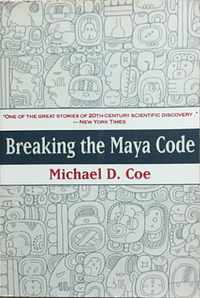Take a photo of a barcode or cover
3.5 stars.
I'm so torn on this book. Breaking the Maya Code presents itself as the real story of how linguists and epigraphers, over several centuries, eventually came to decipher Maya script. And when Coe actually gets around to telling this story, it's so fascinating! Coe is unquestionably an expert Mayanist and epigrapher; but not so great a storyteller.
My main complaint is that this book sorely needs a harsher editor. Coe gets sidetracked so often on delving into the biographies and drama and gossip of nearly every Mayanist he mentions. The problem is that many of the big names in Maya script decipherment were friends and colleagues of his, and he understandably wants to talk all about them as humans. But, frankly, most of it is just not interesting or relevant to the thesis of the book. So often I found myself just starting to get excited about him finally getting into the details of Mayan decipherment, only for some new figure to enter the scene, and I'd groan as Coe launches into another mini-biography of said figure. The middle section in particular felt like such a chore to get through, without the payoff of feeling like I even learned much pertaining to Mayan script.
That being said, I can't deny that I did - eventually - learn a lot from this book. Coe discusses some interesting history around the Mayans and the study of them, and his explanations on the cracking of ancient scripts (Mayan in particular, but he touches on others too while covering general decipherment concepts) were so fascinating to the big linguistics nerd that I am. Unfortunately, it just got overshadowed by the irrelevant self-indulgent personal stories scattered throughout.
TL;DR - While I will say that I did enjoy this book and I learned a lot from it, it desperately needed some editing to tighten up its focus onto the actual subject it purports to teach.
I'm so torn on this book. Breaking the Maya Code presents itself as the real story of how linguists and epigraphers, over several centuries, eventually came to decipher Maya script. And when Coe actually gets around to telling this story, it's so fascinating! Coe is unquestionably an expert Mayanist and epigrapher; but not so great a storyteller.
My main complaint is that this book sorely needs a harsher editor. Coe gets sidetracked so often on delving into the biographies and drama and gossip of nearly every Mayanist he mentions. The problem is that many of the big names in Maya script decipherment were friends and colleagues of his, and he understandably wants to talk all about them as humans. But, frankly, most of it is just not interesting or relevant to the thesis of the book. So often I found myself just starting to get excited about him finally getting into the details of Mayan decipherment, only for some new figure to enter the scene, and I'd groan as Coe launches into another mini-biography of said figure. The middle section in particular felt like such a chore to get through, without the payoff of feeling like I even learned much pertaining to Mayan script.
That being said, I can't deny that I did - eventually - learn a lot from this book. Coe discusses some interesting history around the Mayans and the study of them, and his explanations on the cracking of ancient scripts (Mayan in particular, but he touches on others too while covering general decipherment concepts) were so fascinating to the big linguistics nerd that I am. Unfortunately, it just got overshadowed by the irrelevant self-indulgent personal stories scattered throughout.
TL;DR - While I will say that I did enjoy this book and I learned a lot from it, it desperately needed some editing to tighten up its focus onto the actual subject it purports to teach.
informative
slow-paced
Interesting - but not motivated to read at this time. May be worth returning to.
medium-paced
challenging
informative
inspiring
medium-paced
challenging
informative
slow-paced
This book fulfils what its title promises: it details how the maya glyphs were deciphered and the struggle it took the many Mayanists to get there. If you are looking for a detailed introduction to a Classical (or living) Maya language, this is not your book. Nor will you find all the glyphs that have been deciphered so far with all their variants. No, what you do get is more to the core and possibly more interesting: an introduction to how the system worked and how it was suited to its needs.
We get a comparative chapter on other ancient writing systems, with special attention to Egyptian hieroglyphs and their decipherment in the 19th century, as well as an introduction to the Maya lifestyle. This is followed by the occasional good ideas and many more bad ideas that hindered decipherment. Many other reviewers seem to think that Coe is too severe on Thompson’s role in playing down inventive ideas in the 20th century, but it seems the reason why Coe is so negative towards him is well grounded. After all, it is not uncommon in different scholarly and scientific branches to have people who are so convinced of their own right that, even in the face of irrefutable proof, they will not give in but instead become more vehement in their self-righteousnesss. An excellent example of another field is for instance how Einstein was against the mere idea of the Big Bang, now well-accepted, because it did not fit in with his own theories. It took him many years to wrap his head around it (all the while discrediting the proponents of that theory) until he adapted his own brain stuff.
So, to be short, this book that had been on my want-to-read list, was a really engaging semi-autobiographical book that was informative, fun, and often very sassy. Also makes me want to become a Mayanist, but I’m already a Sinologist :)
We get a comparative chapter on other ancient writing systems, with special attention to Egyptian hieroglyphs and their decipherment in the 19th century, as well as an introduction to the Maya lifestyle. This is followed by the occasional good ideas and many more bad ideas that hindered decipherment. Many other reviewers seem to think that Coe is too severe on Thompson’s role in playing down inventive ideas in the 20th century, but it seems the reason why Coe is so negative towards him is well grounded. After all, it is not uncommon in different scholarly and scientific branches to have people who are so convinced of their own right that, even in the face of irrefutable proof, they will not give in but instead become more vehement in their self-righteousnesss. An excellent example of another field is for instance how Einstein was against the mere idea of the Big Bang, now well-accepted, because it did not fit in with his own theories. It took him many years to wrap his head around it (all the while discrediting the proponents of that theory) until he adapted his own brain stuff.
So, to be short, this book that had been on my want-to-read list, was a really engaging semi-autobiographical book that was informative, fun, and often very sassy. Also makes me want to become a Mayanist, but I’m already a Sinologist :)
emotional
informative
medium-paced
There's too much background history (or the author doesn't tell it well, which is also a problelm) and it takes the author too long to tell his story, but this is interesting, just not as interesting as "The Writing of the Gods" (about the Rosetta Stone). What I found interesting is why it took so long to 'decode' Maya writing and how the various experts got there. What I didn't find so interesting is some of the backstories of the key players, mostly because the author doesn't tell a good story and weave it together very well. There's some interesting characters with strong personalities that get in the way by 'beating down' others with new ideas, but I think the author needed some help telling his story.
It's a great read if you love mostly academic drama and a little bit of linguistics. I mean, the Mayan script wasn't a "code," it was just a language!





